第三人称单数形式#(精选.)
动词第三人称单数的变化规则及练习
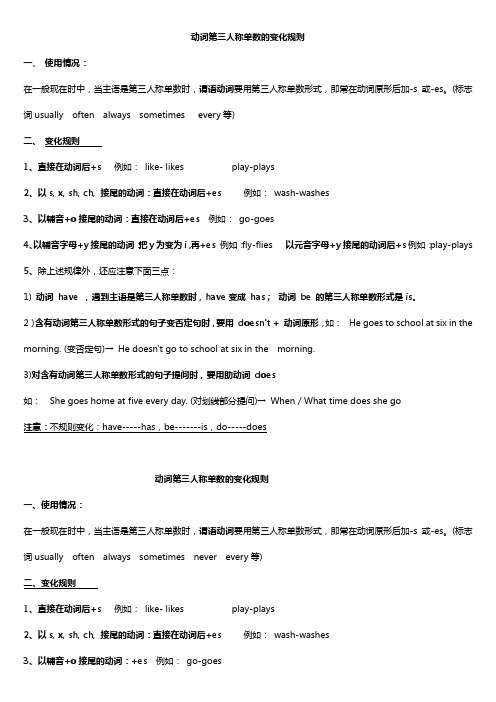
动词第三人称单数的变化规则一、使用情况:在一般现在时中,当主语是第三人称单数时,谓语动词要用第三人称单数形式,即常在动词原形后加-s或-es。
(标志词usually often always sometimes every等)二、变化规则1、直接在动词后+s 例如:like- likes play-plays2、以s, x, sh, ch, 接尾的动词:直接在动词后+es 例如:wash-washes3、以辅音+o接尾的动词:直接在动词后+es 例如:go-goes4、以辅音字母+y接尾的动词:把y为变为i,再+es 例如:fly-flies 以元音字母+y接尾的动词后+s例如:play-plays5、除上述规律外,还应注意下面三点:1)动词have ,遇到主语是第三人称单数时,have变成has;动词be 的第三人称单数形式是is。
2)含有动词第三人称单数形式的句子变否定句时,要用doesn't + 动词原形,如:He goes to school at six in the morning. (变否定句)→He doesn't go to school at six in the morning.3)对含有动词第三人称单数形式的句子提问时,要用助动词does如:She goes home at five every day. (对划线部分提问)→When / What time does she go注意:不规则变化:have-----has,be-------is,do-----does动词第三人称单数的变化规则一、使用情况:在一般现在时中,当主语是第三人称单数时,谓语动词要用第三人称单数形式,即常在动词原形后加-s或-es。
(标志词usually often always sometimes never every等)二、变化规则1、直接在动词后+s 例如:like- likes play-plays2、以s, x, sh, ch, 接尾的动词:直接在动词后+es 例如:wash-washes3、以辅音+o接尾的动词:+es 例如:go-goes4、以辅音字母+y接尾的动词:把y变为i,再+es 例如:fly-flies 以元音字母+y接尾的动词后+s例如:play-plays5、除上述规律外,还应注意下面三点:1)动词have ,遇到主语是第三人称单数时,have变成has;动词be 的第三人称单数形式是is。
第三人称单数的句子
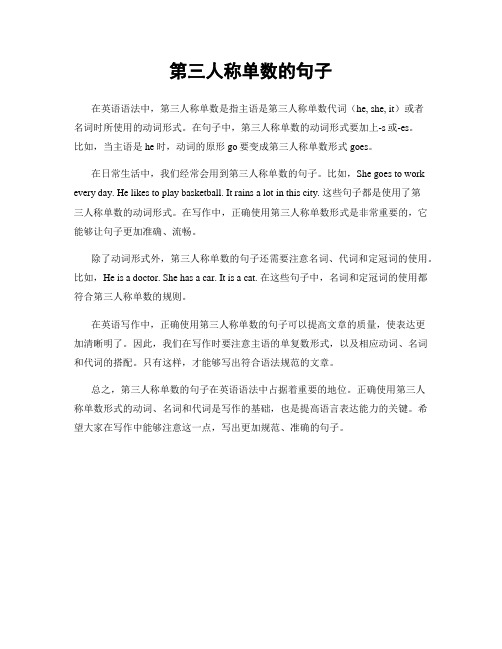
第三人称单数的句子
在英语语法中,第三人称单数是指主语是第三人称单数代词(he, she, it)或者
名词时所使用的动词形式。
在句子中,第三人称单数的动词形式要加上-s或-es。
比如,当主语是he时,动词的原形go要变成第三人称单数形式goes。
在日常生活中,我们经常会用到第三人称单数的句子。
比如,She goes to work every day. He likes to play basketball. It rains a lot in this city. 这些句子都是使用了第
三人称单数的动词形式。
在写作中,正确使用第三人称单数形式是非常重要的,它能够让句子更加准确、流畅。
除了动词形式外,第三人称单数的句子还需要注意名词、代词和定冠词的使用。
比如,He is a doctor. She has a car. It is a cat. 在这些句子中,名词和定冠词的使用都符合第三人称单数的规则。
在英语写作中,正确使用第三人称单数的句子可以提高文章的质量,使表达更
加清晰明了。
因此,我们在写作时要注意主语的单复数形式,以及相应动词、名词和代词的搭配。
只有这样,才能够写出符合语法规范的文章。
总之,第三人称单数的句子在英语语法中占据着重要的地位。
正确使用第三人
称单数形式的动词、名词和代词是写作的基础,也是提高语言表达能力的关键。
希望大家在写作中能够注意这一点,写出更加规范、准确的句子。
一般现在式第三人称用法规则

一般现在式第三人称用法规则
一般现在式第三人称用法规则是在英语语法中常见的规则。
在使用一般现在式时,当主语为第三人称单数(即除了“我”和“你”以外的人或物)时,动词需要做出相应的变化。
首先,对于大多数动词,我们只需在动词后加上“-s”来表示第三人称单数的形式。
比如,动词“like”在第三人称单数时变为“likes”。
类似地,动词“runs”是动词“run”的第三人称单数形式。
然而,对于以“s”、“x”、“sh”、“ch”或“o” 结尾的动词,我们需要在动词后加上“-es”来形成第三人称单数形式。
例如,动词“pass” 在第三人称单数时变为“passes”,动词“fix” 变成“fixes”。
同样,动词“go” 成为“goes”。
还有一些特殊的动词,它们在第三人称单数时会发生更大的变化。
例如,动词“have” 在第三人称单数中变为“has”,动词“do”变成“does”。
此外,需要注意的是,有些动词在第三人称单数时不做任何变化。
例如,动词“can” 和“must” 在第三人称单数时仍然保持原样。
掌握一般现在式第三人称用法规则对于正确理解和使用英语语言至关重要。
熟练运用这些规则可以帮助我们正确构建句子,表达准确的意思。
第三人称单数用法讲解及练习题

动词第三人称单数形式讲解一、什么是第三人称单数?人称可分为三类:第一人称、第二人称和第三人称第一人称:I we第二人称:you第三人称:he、she、it、they和人名类(如:Peter、Jane、my father等)结合以上知识,第三人称单数就是he、she、it和单个的某人,也包括单个的动物、东西等。
二、动词为什么要变成相应的三单形式?在一般现在时中,跟在第三人称单数后面的动词也要变成相应的三单形式,例如:I watch TV every day. 如果主语是三单,动词要变化:He watches TV every day.She watches TV every day.Jane watches TV every day.三、动词三单的变化规则1、一般情况下直接加s,如speak-speaks, like-likes, play-plays2、以s, x, sh, ch, o 结尾的加es,如wash-washes, go-goes, do-does, watch-watches3、以辅音字母+y 结尾的,改y 为i 再加es,如study-studies,try-tries4、特殊变化,如have-has四、does和doesn’t 在句子中的用法否定句:主语+don’t/doesn’t+动词原形+(其他)。
如:I don’t watch TV. 我不看电视。
当主语为第三人称单数时,要用doesn’t 构成否定句。
如:He doesn’t watch TV. 他不看电视。
注意doesn’t后面用动词原形watch,而不是watches一般疑问句:Do / Does+主语+动词原形+(其他)。
如:Do you watch TV? Yes, I do. / No, I don’t.当主语为第三人称单数时,要用does 构成一般疑问句。
如:Does she watch TV? Yes, she does. / No, she doesn’t.特殊疑问句:疑问词+一般疑问句。
一般现在时动词第三人称单数变化规则

一般现在时动词第三人称单数变化规则
1. 对于大多数动词,直接在动词后面加上-s。
例如:She plays tennis on Sundays.(她在星期天打网球。
)
2. 如果动词以辅音字母+y结尾,要先将y改为i,再加上-es。
例如:He studies history every day.(他每天学习历史。
)
3. 如果动词以s, sh,ch, x或o结尾,要加上-es。
例如:She washes her car every week.(她每周洗她的车。
)
4. 如果动词以辅音字母+o结尾,要在动词后加上-es。
例如:He goes to school by bus.(他乘公共汽车去学校。
)
5. 对于以元音字母+y结尾的动词,直接在动词后面加上-s。
例如:The baby cries when he is hungry.(婴儿饿了会哭。
)
需要注意的是,有一些常见的不规则动词在第三人称单数时变化规则
不同,例如be动词,其第三人称单数形式是is,have动词的第三人称单
数形式是has等。
英语第三人称单数的规则
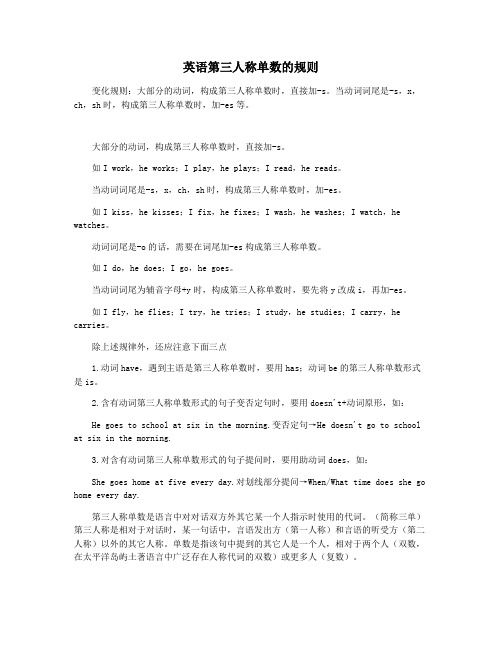
英语第三人称单数的规则变化规则:大部分的动词,构成第三人称单数时,直接加-s。
当动词词尾是-s,x,ch,sh时,构成第三人称单数时,加-es等。
大部分的动词,构成第三人称单数时,直接加-s。
如I work,he works;I play,he plays;I read,he reads。
当动词词尾是-s,x,ch,sh时,构成第三人称单数时,加-es。
如I kiss,he kisses;I fix,he fixes;I wash,he washes;I watch,he watches。
动词词尾是-o的话,需要在词尾加-es构成第三人称单数。
如I do,he does;I go,he goes。
当动词词尾为辅音字母+y时,构成第三人称单数时,要先将y改成i,再加-es。
如I fly,he flies;I try,he tries;I study,he studies;I carry,he carries。
除上述规律外,还应注意下面三点1.动词have,遇到主语是第三人称单数时,要用has;动词be的第三人称单数形式是is。
2.含有动词第三人称单数形式的句子变否定句时,要用doesn't+动词原形,如:He goes to school at six in the morning.变否定句→He doesn't go to school at six in the morning.3.对含有动词第三人称单数形式的句子提问时,要用助动词does,如:She goes home at five every day.对划线部分提问→When/What time does she go home every day.第三人称单数是语言中对对话双方外其它某一个人指示时使用的代词。
(简称三单)第三人称是相对于对话时,某一句话中,言语发出方(第一人称)和言语的听受方(第二人称)以外的其它人称。
第三人称单数主语的六种形式
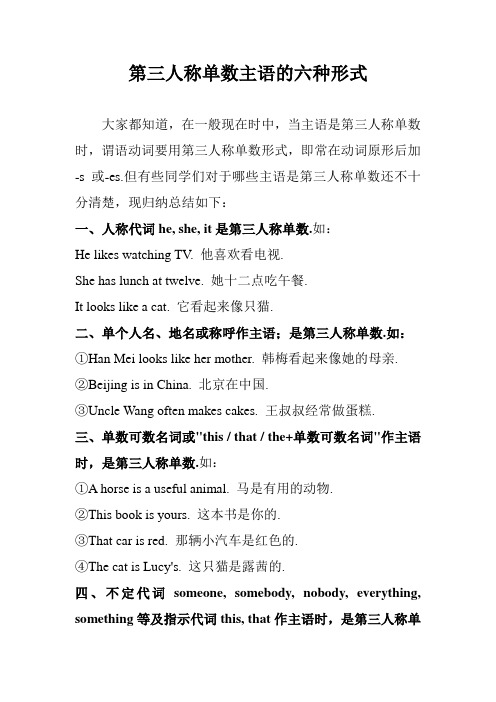
第三人称单数主语的六种形式大家都知道,在一般现在时中,当主语是第三人称单数时,谓语动词要用第三人称单数形式,即常在动词原形后加-s或-es.但有些同学们对于哪些主语是第三人称单数还不十分清楚,现归纳总结如下:一、人称代词he, she, it是第三人称单数.如:He likes watching TV. 他喜欢看电视.She has lunch at twelve. 她十二点吃午餐.It looks like a cat. 它看起来像只猫.二、单个人名、地名或称呼作主语;是第三人称单数.如:①Han Mei looks like her mother. 韩梅看起来像她的母亲.②Beijing is in China. 北京在中国.③Uncle Wang often makes cakes. 王叔叔经常做蛋糕.三、单数可数名词或"this / that / the+单数可数名词"作主语时,是第三人称单数.如:①A horse is a useful animal. 马是有用的动物.②This book is yours. 这本书是你的.③That car is red. 那辆小汽车是红色的.④The cat is Lucy's. 这只猫是露茜的.四、不定代词someone, somebody, nobody, everything, something等及指示代词this, that作主语时,是第三人称单数.如:①Everyone is here. 大家到齐了.②There is something wrong with the watch. 这块手表有毛病.③This is a pen. 这是一支钢笔.④That is an eraser. 那是一块橡皮擦.五、不可数名词作主语时为第三人称单数.如:①The milk is in the glass. 牛奶在玻璃杯里.②The bread is very small. 那面包很小.六、当数字或字母作主语时,看作第三人称单数.如:①"6" is a lucky number. "6"是个吉利数字.②"I" is a letter. "I"是个字母.。
第三人称单数总结
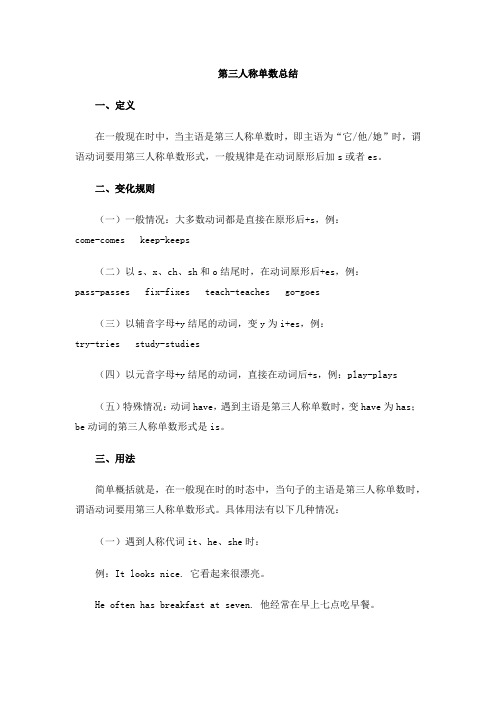
第三人称单数总结一、定义在一般现在时中,当主语是第三人称单数时,即主语为“它/他/她”时,谓语动词要用第三人称单数形式,一般规律是在动词原形后加s或者es。
二、变化规则(一)一般情况:大多数动词都是直接在原形后+s,例:come-comes keep-keeps(二)以s、x、ch、sh和o结尾时,在动词原形后+es,例:pass-passes fix-fixes teach-teaches go-goes(三)以辅音字母+y结尾的动词,变y为i+es,例:try-tries study-studies(四)以元音字母+y结尾的动词,直接在动词后+s,例:play-plays(五)特殊情况:动词have,遇到主语是第三人称单数时,变have为has;be动词的第三人称单数形式是is。
三、用法简单概括就是,在一般现在时的时态中,当句子的主语是第三人称单数时,谓语动词要用第三人称单数形式。
具体用法有以下几种情况:(一)遇到人称代词it、he、she时:例:It looks nice. 它看起来很漂亮。
He often has breakfast at seven. 他经常在早上七点吃早餐。
She likes dancing. 她喜欢跳舞。
(二)单个人名、地名或称呼作主语时:例:Li Lei looks like his father. 李雷看起来像他爸爸。
Fu jian is in China. 福建在中国。
Uncle Zhan often makes cakes. 詹叔叔经常做蛋糕。
(三)单数可数名词或“this/that/the+单数可数名词”作主语时:例:An apple is on the desk. 有一个苹果在桌上。
This car is black. 这辆车是黑色的。
That book is yours. 那本书是你的。
The cat looks so cute. 这只猫看起来真可爱。
- 1、下载文档前请自行甄别文档内容的完整性,平台不提供额外的编辑、内容补充、找答案等附加服务。
- 2、"仅部分预览"的文档,不可在线预览部分如存在完整性等问题,可反馈申请退款(可完整预览的文档不适用该条件!)。
- 3、如文档侵犯您的权益,请联系客服反馈,我们会尽快为您处理(人工客服工作时间:9:00-18:30)。
①The milk is in the glass. 牛奶在玻璃杯里。
②The bread is very small. 那面包很小。
六、当数字或字母作主语时,看作第三人称单数。
如:②"I" is a letter. "I"是个字母。
二、把下列动词变为第三人称单数形式。
1. clean—2. go--3. have--4. do--5. play--6. fly—7. come—8. brush-- 9. watch-- 10. study-- 11. ask-- 12. answer-- 13. swim-- 14. catch-- 15. write-- 16. eat-- 17. make-- 18. paint-- 19. learn-- 20. phone-- 21. run--22. hop-- 23. sing-- 24. pick--三、选出正确的答案:1. She (like / likes) to play football.2. He (like / likes) drinking milk.3. I (like / likes) to watch TV.4. We (like / likes) to play badminton.5. They (like / likes) to sing songs.6. She (read / reads) books every day.7. He (play / plays) computer games every day.8. It (listen / listens) to the radio every day.9. Linda (draw / draws) pictures every day.10. Jane and Linda (play / plays) football every day.1.He often ________(have) dinner at home.2.We _______(not watch) TV on Monday.3.Nick _______(not go) to the zoo on Sunday.4.______ they ________(like) the World Cup?5.What _______they often _______(do) on Saturdays?6._______ your parents _______(read) newspapers every day?7.The girl _______(teach) us English on Sundays.8.She and I ________(take) a walk together every evening.9.There ________(be) some water in the bottle.10.Mike _______(like) cooking.11.They _______(have) the same hobby.12.My aunt _______(look) after her baby carefully.13.You always _______(do) your homework well.14.I _______(be) ill. I’m staying in bed.15.She _______(go) to school from Monday to Friday.16.Liu Tao _______(do) not like PE.17.The child often _______(watch) TV in the evening.18.Su Hai and Su Yang _______(have) eight lessons this term练习一、将括号里动词的适当形式填入横线上。
1.He often ________(have) dinner at home.2.We _______(not watch) TV on Monday.3.Nick _______(not go) to the zoo on Sunday.4.______ they ________(like) the World Cup?5.What _______they often _______(do) on Saturdays?6._______ your parents _______(read) newspapers every day?7.The girl _______(teach) us English on Sundays.8.She and I ________(take) a walk together every evening.9.There ________(be) some water in the bottle.10.Mike _______(like) cooking.11.They _______(have) the same hobby.12.My aunt _______(look) after her baby carefully.13.You always _______(do) your homework well.14.I _______(be) ill. I’m staying in bed.15.She _______(go) to school from Monday to Friday.16.Liu Tao _______(do) not like PE.17.The child often _______(watch) TV in the evening.18.Su Hai and Su Yang _______(have) eight lessons this term.19. He________ TV every evening. (watch)20.John ________ like his father. (look)I ________ in the corridors. (walk)l He _________ in the corridors. (run)l She ___________ her face once a day. (wash)l They ____________ their teeth once a day. (brush)l You ___________ up your clothes once a day. (hang)l We ____________ our home work once a day. (finish)l He ____________ rubbish in the classroom. (throw)l She _____________ rubbish on the floor. (throw)l I _____________ rubbish in the bin. (throw)l They ___________ the table once a day. (set)l Peter never _________ in the corridors. (run)l Mary usually _________ the table. (set)l Pat and Ken _________ the plants in the morning. (water)l The boy __________ his hair once a day. (comb)l Miss Cheng _________ TV at home. (watch)l My sister __________ his schoolbag once a day. (pack)l My mother _________ dinner for me. (cook)l My parents _________ the house at Chinese New Year. (clean)l My teachers _________ us some gifts. (give)l My friends _________ the table with me. (set)练习二、选择正确的单词填到括号里。
1. What does Candy __________ (wants,want) to be ?2. You __________ (should,shouldn’t) be quiet in the library.3. He shouldn’t ___________ (throw,throws) rubbish on the floor.4. Peter ___________ (help,helps) his mother at home.5. She never _________ (run,runs) in the corridors.6. We should __________ (walks,walk) in the corridors.7. He _________ (don’t,doesn’t) get up early.8. How often __________ (do,does) your father go to bed?练习三、将下列句子改成第三人称He的句型(看例句)例句:I brush my teeth once a day.---- 改:He brushes his teeth once a day.1.I comb my hair twice a day.2.They go to school at six in the morning.3.You wash your face and put on your clothes.4.When do you get up?5.How often do you hang up your clothes?练习四1. He __________(watch) TV every day.2. He _________(go) to school on his bike.3. Dad _________(wash) the dishes for us every day.4. My uncle _________(not go) fishing at the weekends.5. My brother _______(not like) playing football.6. The twin brother _________(enjoy) going to the concert.7. One of the students often __(do) his homework after 10 p.m. It is wrong.8. Lucy often ________(chat) with Millie.9. Tom usually ______(have) a fast breakfast in the morning so he ____(feel) hungry early.10. -_______ he ________ (go) bed early?---Yes, he _______.11. The sunshine ________(bring) us warmth(温暖).12. Sam usually _________(fly) kites with his father in May.13. Sometimes the little boy_________(cross) the road himself.14. Nick _______(miss) a turn because he is late.15. Sandy _______(study) harder than before.16. My parents often _______(let) me choose what to do.17. -________ Amy _________(close) the window? -No, she ________.18. The little girl often ________(cry).19. _______ she _______(help) you ________(do) some cleaning on Sunday?20. He often ___(do) some ____(shop) or ___(listen) to music with his family.练习六句型转换1. I go to school by bus. (用He做主语)2. Kim plays baseball very well. (变一般疑问句)3. She plays sports every day. (变否定句)4. David doesn’t like French. (变肯定句)5.They like watches. (变否定句)6.Alan doesn’t watch TV on school nights. (变肯定句)7. We have time to do it. (变否定句)8.John has a car. (对划线部分提问)9. Do you have a pencil? (把主语改成she)10.Sonia Hall likes hamburgers .(划线部分提问)练习七、填空,根据括号内的单词写出其正确的形式。
